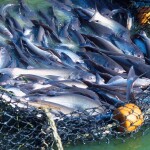Once again, U.S. lawmakers are pushing legislation that would require online retailers to clearly display country-of-origin labeling (COOL) for their products.
U.S. law requires traditional brick-and-mortar retailers to provide information on where products, including seafood, originate. However, those requirements don’t apply to e-commerce websites, enabling online retailers to avoid disclosing that type of information. Some lawmakers looking to close this legal loophole – U.S. Senator Tammy Baldwin (D-Wisconsin) and U.S. Senator J.D. Vance (R-Ohio) – introduced the COOL Online Act in 2023 to do just that.
“The American people deserve to know where the products they buy are made, regardless of whether they’re shopping in-store or online,” Vance said. “Our legislation would close a legal loophole by extending current, commonsense labeling requirements to e-commerce. With this proposal, we can give American consumers the confidence that their online purchases support American workers and industry.”
In November 2023, an identical bill was introduced in the U.S. House of Representatives by U.S. Representative Andy Kim (D-New Jersey) and U.S. Representative Carlos Gimenez (R-Florida).
“At one of my town halls, a constituent raised a concern they had with me,” Kim said. “They felt that people should know where something they’re buying comes from. It’s about transparency; Americans deserve to know where their products are made.”
Peter Quinter, a U.S. customs and international trade attorney and shareholder with Florida law firm Gunster, said the legislative push has emerged courtesy of a renewed interest among U.S. consumers in tracing product origin.
“There is a reemphasis generally for U.S. consumers to know the country of origin of imported merchandise that is purchased online or at a local retailer,” Quinter said. “Such merchandise includes food, especially perishables such as fruits, vegetables, and seafood. The reason for such a renewed emphasis is both for health reasons and for political reasons (e.g., no Russian origin seafood or Chinese seafood subject to antidumping duties). ‘Traceability’ and ‘international supply chain’ are terms that are now commonly used and understood by American consumers as a result of the Covid-19 pandemic, when Americans realized that they relied upon personal protective equipment (PPE) almost entirely that was produced outside the United States.”
That consumer interest is putting increased pressure on online retailers to display more country-of-origin and traceability information for their products, although many are hesitant to incorporate the burdensome documentation into their e-commerce business.
“Online retailers will have to implement traceability guidelines that require substantial documentation from the manufacturer through the international supply chain,” Quinter said. “This is a daunting task as we have learned from our experience with seafood, but it can be done and is being done.”
The current bill may face an uphill battle to become a law, as an effort to pass similar legislation in 2022 failed. Additionally, the bill’s proponents managed to include a COOL Online provision in the 2021 Senate version of the United States Innovation and Competition Act, but it was dropped from the final version of the bill that became law.
A coalition of retail and business organizations, including the National Grocers Association, the National Retail Federation, and the U.S. Chamber of Commerce, opposed the 2022 effort.
“We remain concerned about the broad impact that this provision will have on all retailers and sellers who operate in an online environment, whether they are a marketplace or just have an e-commerce website,” the groups wrote in a joint 2022 letter. “Determining the country of origin for a product is an extremely complex issue that is determined through our trade laws and enforced by U.S. Customs and Border Protection.”
“The provision will not create parity among brick-and-mortar and online stores,” the letter continued. “It will create a new liability for retailers and sellers to not only post the required information but certify the accuracy of the information provided by product vendors.”
That level of opposition is hard to overcome, Quinter said. Nevertheless, he expressed confidence that the concept would eventually become legally binding in some form or another.
“I do not believe that the COOL Online Act will pass into law. There are too few co-sponsors, a lack of priority in both the Senate and House, and lobbying organizations opposed to the legislation, which some consider unnecessary and burdensome,” Quinter said. “[But] eventually, the concept will be incorporated into law.”







